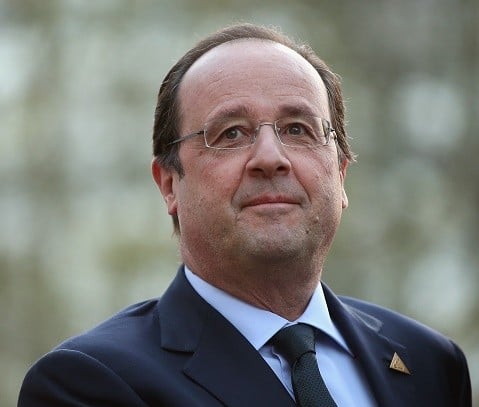What is François Hollande's Net Worth?
François Hollande is a French politician who has a net worth of $2 million. François Hollande served as the 24th President of France from 2012 to 2017, representing the Socialist Party as the first left-wing president of the French Fifth Republic since François Mitterrand. Before his presidency, Hollande built his political career as a National Assembly deputy, mayor of Tulle, and First Secretary of the Socialist Party for eleven years (1997-2008). His single presidential term was marked by significant challenges including economic stagnation, terrorist attacks, and declining popularity. Hollande's presidency is remembered for progressive social reforms such as the legalization of same-sex marriage and efforts to address climate change, culminating in the 2015 Paris Agreement. However, his economic policies and leadership style generated controversy, leading to his unprecedented decision not to seek re-election in 2017. Since leaving office, Hollande has maintained a presence in French public life through writing, speaking engagements, and occasional political commentary.
Financial Disclosures
Based on his 2017 asset declaration, François had a net worth equal to $1.1 million USD. Below is a more detailed breakdown:
Net Worth:
Approx. €1.0–1.1 million → $1.08–$1.19 million USD
(Total assets of ~€1.3M minus ~€288K in liabilities)
Declared Assets:
- Primary residence (house): €800,000 → $864,000 USD
- Apartment (70% ownership): €300,000 → $324,000 USD
- Share in SCI real estate entity: €200,000 → $216,000 USD (Hollande's portion)
- Life insurance (cash value): €3,308 → $3,572 USD
- Bank accounts (total): €5,100 → $5,508 USD
- No vehicles, valuables, or other movables declared
Declared Liabilities:
- Four bank loans totaling: ~€118,300 → $127,764 USD
- Two debt obligations from a 2011 asset division: €140,000 + €30,000 = €170,000 → $183,600 USD
- Total liabilities: ~€288,000 → $311,040 USD
- Annual Income (while in office):
Presidential gross salary (2012–2017): €179,000/year → $193,320 USD/year
Early Life and Education
Born on August 12, 1954, in Rouen, Normandy, François Gérard Georges Nicolas Hollande grew up in a middle-class family. His father, Georges Hollande, was a doctor with right-wing political views, while his mother, Nicole Tribert, was a social worker with progressive leanings. This politically diverse household may have influenced Hollande's later tendency toward moderation and compromise.
Hollande received an elite education, attending the prestigious École Nationale d'Administration (ENA), which has produced many of France's top civil servants and political leaders. Before ENA, he studied at HEC Paris, one of France's premier business schools, and Sciences Po, the Paris Institute of Political Studies. This educational background provided him with strong connections in France's political establishment and a solid understanding of economic policy.
Hollande's political career began in earnest when he joined the Socialist Party in 1979. His ascent through party ranks was steady rather than meteoric. He first gained elected office as a deputy in the National Assembly in 1988, representing Corrèze, a rural department in central France.
A significant turning point came in 1997 when Hollande was elected First Secretary of the Socialist Party. He would hold this position for eleven years, making him the longest-serving leader in the party's history. During this period, he developed a reputation as a consensus-builder and a pragmatic politician, though critics sometimes characterized him as indecisive.
Simultaneously, Hollande built his local political base as mayor of Tulle (2001-2008) and president of the General Council of Corrèze (2008-2012). This local governance experience would later become a key component of his presidential campaign narrative.

(Photo by Stephane Cardinale – Corbis/Corbis via Getty Images)
Path to the Presidency
Hollande's road to the Élysée Palace opened unexpectedly when Dominique Strauss-Kahn, the Socialist Party's presumptive nominee, was embroiled in scandal in 2011. Hollande emerged from the subsequent primary elections as the party's candidate, presenting himself as "Mr. Normal" in deliberate contrast to the flamboyant incumbent President Nicolas Sarkozy.
The 2012 presidential campaign saw Hollande promise to increase taxes on the wealthy, create jobs, and renegotiate European austerity measures. His moderate, measured approach resonated with voters fatigued by economic crisis and Sarkozy's hyperactive style. On May 6, 2012, Hollande defeated Sarkozy with 51.6% of the vote, becoming France's first Socialist president in 17 years.
Presidential Term and Key Policies
Hollande's presidency was quickly tested by economic challenges. His signature 75% tax on incomes above €1 million proved controversial and was eventually abandoned. While he implemented some business-friendly reforms later in his term, unemployment remained stubbornly high, and economic growth was minimal.
In social policy, Hollande achieved more notable successes. The legalization of same-sex marriage in 2013, despite significant conservative opposition, stands as perhaps his most enduring domestic achievement. His government also implemented education reforms, expanded healthcare coverage, and established measures to reduce inequality.
On the international stage, Hollande authorized military interventions in Mali (2013) and against ISIS in Iraq and Syria. His leadership during the November 2015 Paris terrorist attacks, which claimed 130 lives, briefly unified the country and saw his approval ratings temporarily rise.
Climate policy represented another significant focus, culminating in the 2015 Paris Agreement. Hollande's diplomatic efforts as host of the COP21 climate conference helped secure this landmark international accord.

Sean Gallup/Getty Images
Decline and Legacy
Despite these accomplishments, Hollande's presidency was marked by declining popularity. By 2016, his approval ratings had fallen to historic lows, sometimes dipping below 10%. His leadership style was criticized as indecisive, and he faced opposition from both left and right.
Personal scandals, including the revelation of an affair with actress Julie Gayet, further damaged his public image. Within his own party, Hollande faced growing dissent, particularly from the left wing that viewed his economic policies as too conservative.
In a shocking announcement in December 2016, Hollande became the first French president of the Fifth Republic to decline to seek re-election. This decision acknowledged his deep unpopularity and opened the way for Emmanuel Macron, his former economy minister, to emerge as France's next president.
Post-Presidency Activities
Since leaving office in 2017, Hollande has maintained a relatively low profile. He established the "France is Committed" foundation to support social projects and has authored several books, including "Lessons of Power," a reflection on his presidency.
Hollande occasionally comments on French and European politics, sometimes criticizing his successor's policies. Unlike many former French presidents, he has remained somewhat engaged with his political party, though his influence has diminished.










 Bengali (BD) ·
Bengali (BD) ·  English (US) ·
English (US) ·